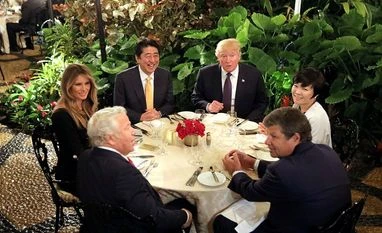The announcement came after Trump criticised Japan for what he said were “unfair” trade practices hampering US auto exports to the country. Japan had the second-largest trade surplus with the US last year, with the bulk of the difference due to trade in vehicles. Japanese Prime Minister Shinzo Abe has rejected the charge and underscored the fact that Japanese automakers in the US provide jobs for US citizens.
The two leaders “emphasised that they remain fully committed to strengthening the economic relationships between their two countries and across the region, based on rules for free and fair trade,” they said in their statement.
Vice-president Mike Pence and Japanese Deputy Prime Minister Taro Aso will lead the economic talks, Abe said at a joint news conference with Trump. Pence is expected to pay a visit to Tokyo following an invitation from the Japanese government.
Abe had warned earlier in the day that hacking, anti-trust laws and mistrust between the world’s largest nations are hindering global trade, warning of a “threat” to the world economy in a speech to the US Chamber of Commerce.
Abe noted in his speech to business leaders that 70 per cent of Japanese cars intended for the American market are produced in the U.S, adding that no one in Japan complains about losing jobs because the Japanese have gained from the business as well.
To read the full story, Subscribe Now at just Rs 249 a month
Already a subscriber? Log in
Subscribe To BS Premium
₹249
Renews automatically
₹1699₹1999
Opt for auto renewal and save Rs. 300 Renews automatically
₹1999
What you get on BS Premium?
-
Unlock 30+ premium stories daily hand-picked by our editors, across devices on browser and app.
-
Pick your 5 favourite companies, get a daily email with all news updates on them.
Full access to our intuitive epaper - clip, save, share articles from any device; newspaper archives from 2006.
Preferential invites to Business Standard events.
Curated newsletters on markets, personal finance, policy & politics, start-ups, technology, and more.
Need More Information - write to us at assist@bsmail.in
)